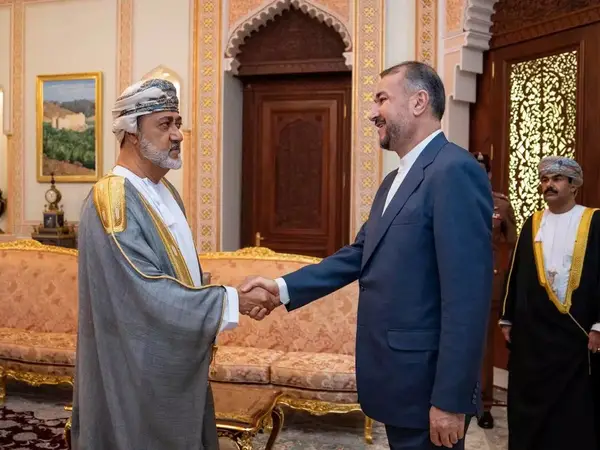The Iranian foreign minister’s Oman visit reflects continuing regional diplomacy over the Iran nuclear agreement, trade, Yemen, and Arab relations with Israel.
Hossein Amir-Abdollahian met Wednesday in Muscat with the Omani Sultan Haitham bin Tariq, calling Oman the “epicenter” of regional talks. With Yemen, Afghanistan, and Ukraine all on the agenda, the minister said these issues had to be addressed “at a faster pace.”
There is speculation, encouraged by phone calls between Amir-Abdollahian and his Omani counterpart December 22, that Muscat has a role in restoring the 2015 Iran nuclear agreement, the JCPOA (Joint Comprehensive Plan of Action). Muscat’s mediation goes back to facilitating secret Iran-United States contacts before the 2015 deal. European Union spokesman Peter Stano December 26 explained Amir-Abdollahian’s meeting in Jordan December 20 with EU foreign policy chief Joseph Borrell’s as “moving talks about JCPOA revival forward.”
Omani mediators have also been in Sanaa trying to bridge gaps between the government of Rashid al-Alimi and the main opposition Ansar Allah, known as the Houthis, over extending the fragile eight-month ceasefire. Iran has given some support to Ansar Allah, while Saudi Arabia began in 2015 direct military involvement, mainly with its air force.
Reports said the Omanis left December 25 without resolving differences as to whether the government or Ansar Allah should pay fighters and state employees in the third of Yemen, including 80 percent of the population, under Ansar Allah’s control. At least 370,000 people have died in the eight-year conflict, which began with protests against then president Ali Abdullah Saleh. The United Nations says a child is dying every ten minutes from preventable causes.
Keen to see the JCPOA restored, Oman has distanced itself from any push towards ‘normalization’ with Israel through extending the 2020 US-brokered ‘Abrahamic accords,’ which were widely portrayed in the US as a move against Iran. After the critical reaction of Arab football fans to Israeli journalists in December’s World Cup, and with a new Israeli government including far-right parties committed to speeding up Jewish settlements in occupied land, Muscat is mulling legislation similar to laws passed in Iraq and Kuwait sanctioning trade with Israel.
“Anything related to Israel-Saudi relations outside of security matters…has largely left the Saudi media,” the Jerusalem Post noted Wednesday. “Oman never had any serious intention of joining [the Abrahamic accords].”
Expanding trade, ‘friends with all’
Iranian regional diplomacy is pushing both the need for dialogue and expanding trade. Both were discussed at the ‘Baghdad 2’ conference December 20-21, where an Iranian delegation led by Amir-Abdollahian met with leading officials and politicians from Turkey, Saudi Arabia, Qatar, the United Arab Emirates, Kuwait, Bahrain, Oman, Egypt, France, Iraq, Jordan, and the EU.
Critical reaction in Tehran was fairly muted to a joint statement issued after the December 9 Arab-China summit where Riyadh and Beijing agreed “joint cooperation to ensure the peaceful nature of Iran’s nuclear program.” Business Insider noted December 20 that many could see that “Beijing would rather balance its relationship with regional competitors,” pursuing “a friends-with-all approach” that both expands $87-billion bilateral trade with the Saudis and also pursues, despite US sanctions, the 2021 25-year cooperation agreement with Iran envisaging potentially $400-billion Chinese investment in exchange for stable, discounted oil supplies.
Oman faces greater difficulties in two gas projects with Iran, one to supply 10 billion cubic meters/year of Iranian gas over 15 years, and one as a conduit for a 1400km, $7-billion pipeline from Iran to India for 11.3bm3/year, for which New Delhi signed a memorandum-of-understanding with Russia’s Gazprom in 2019.
However, neither Iran nor Oman has the technology to lay deep-sea pipelines and the long-delayed project needs Western technology, which in turn needs the lifting of US sanctions.
